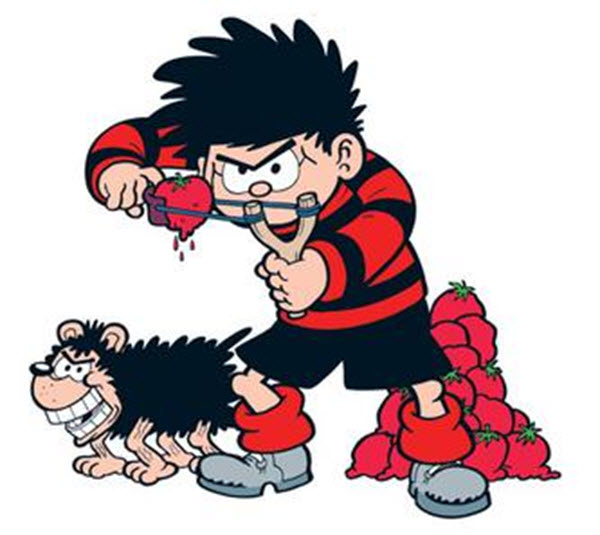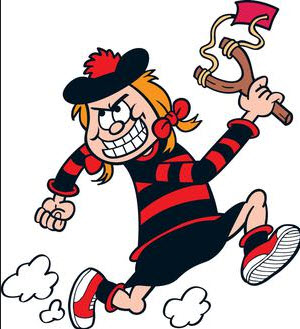
Get ready for the ultimate birthday bash as the nation’s most cherished and long-running comic goes all out with a collectable front cover and comic strip! This celebration is set to be one for the ages, filled with laughter, mischief, and nostalgic charm.
It’s time to hold on to your comic strips because it’s time to welcome “The Beano Philosophers“! In this whimsical crossover, our mischievous friends from the UK comic “The Beano” are taking a detour from their usual pranks and capers to explore the wild world of philosophical ideas and concepts. From Dennis the Menace questioning the meaning of existence to Minnie the Minx challenging traditional gender roles with feminist philosophy, get ready for a mind-boggling ride that will tickle your brain cells and keep you giggling!
So, grab your party hats and get ready to join the fun as the beloved comic marks this milestone with a bang! This special celebration is all about embracing the best bits of being a kid in 2023, and guess what? This time around, it’s a massive collaboration like never before, with thousands of kids putting their mischievous minds together – making it the grandest edit in Beano’s history! Talk about a mega collaboration of mischief-makers! The Beano comic is turning 85 and throwing a star-studded bash like never before!
It’s a birthday extravaganza you won’t want to miss – a timeless reminder of the mischief, laughter, and joy that the Beano comic has brought to generations of kids and kids at heart!
Pranksters and Ponderers
As the Beano gang have entertained millions of adults and children alike spanning generations, we look into the philosophical life lessons these characters that lived alongside us all these years have taught us about life.
Join us as we witness Gnasher and the gang face moral dilemmas that lead to debates on consequentialism and ethics. As they sink their teeth into the juicy discussions, you’ll find yourself pondering the rightness and wrongness of their actions. But don’t worry, there’s no need to call the Dog Patrol just yet – these lovable rascals will surely find a way to chew on the complexities of philosophy while still being the fun-loving characters we know and adore.
So, buckle up and get ready for a comic adventure that proves philosophy isn’t just for old scholars in stuffy libraries – it’s for everyone, even for kids and adults who refuse to grow up! “The Beano Philosophers” will tickle your funny bone and tickle your brain, leaving you with a smile and a newfound appreciation for the quirky world of philosophical ideas.
1. Dennis the Menace – Existentialism:
Dennis, the mischievous and free-spirited troublemaker, finds himself pondering the meaning of existence and individuality. He embraces the philosophy of existentialism, questioning authority, and discovering his authentic self in a chaotic world.
Dennis the Menace’s foray into existentialism commences from a profound discontent with the prevailing norms and conventions of Beano Town. He questions the rules, norms, and authority figures that seem to suppress his individuality and freedom. Feeling like an outsider, Dennis starts to reflect on the meaning of his existence and the purpose of life itself.
Freedom and Rebellion
Existentialism emphasizes individual freedom and the responsibility that comes with it. Dennis rebels against the constraints imposed by adults and society. He refuses to conform to the expectations placed upon him, seeking autonomy in his actions and decisions.
Angst and Authenticity
As he delves deeper into existential thought, Dennis experiences angst – a profound feeling of anxiety and alienation arising from the uncertainties of life. He realizes that life has no predetermined meaning, which can be both daunting and liberating. Instead of avoiding this existential anxiety, he embraces it, seeing it as an integral part of his journey towards authenticity.
Search for Identity
Existentialism emphasizes the individual’s responsibility to create their own identity. Dennis is no longer content with the superficial labels society imposes on him, such as “menace” or “troublemaker.” He sets forth on an odyssey of self-discovery, seeking to grasp his authentic self beyond the confines of simplistic labels and categorizations.
Questioning Authority and Tradition
Existentialists often challenge traditional authority and question societal norms. Dennis doesn’t blindly accept rules but seeks to understand their relevance and validity. He becomes a voice for questioning the establishment, often playfully challenging figures of authority like his parents, teachers, and even the mayor of Beano Town.
Embracing the Absurd
Existentialism recognizes the absurdity of life, where there might not be a grand overarching purpose. Dennis finds solace in embracing the absurdity of his existence. He takes joy in simple pleasures, living in the present moment, and creating his own meaning in a seemingly chaotic world.
Emotional Authenticity
Existentialism encourages individuals to be authentic and true to their emotions. Dennis unabashedly expresses his emotions, refusing to wear a mask to fit into society’s expectations. He expresses his emotions openly, be it frustration, joy, or curiosity.
Facing the Void
As Dennis contemplates the meaning of existence, he confronts the idea of nothingness or the void that lies beyond life. Rather than fearing this void, he learns to appreciate the finite nature of life, motivating him to make the most of every moment.
Creating Meaning and Purpose
Existentialism rejoices in the individual’s capacity to forge their own meaning and purpose in the journey of life. Dennis takes this to heart and begins to find meaning in his relationships, adventures, and the pursuit of personal passions. In the realm of existentialism, freedom is intertwined with the weight of responsibility for one’s actions and decisions. Dennis learns that his freedom isn’t without consequences, and he becomes more aware of how his actions impact others. This understanding leads him to make more considered decisions, balancing his quest for freedom with empathy and compassion.
Through embracing existentialism, Dennis transforms from being just a mischievous kid into a young philosopher who challenges the norms, seeks his authentic self, and finds beauty and freedom in the uncertainties of existence. His adventures become more profound as he navigates the complexities of life with newfound wisdom and a zest for authenticity.
2. Minnie the Minx – Feminist Philosophy

Minnie is a symbol of empowerment and challenges traditional gender roles. She explores feminist ideas, promoting equality and breaking down societal barriers for girls and women in Beano Town.
Minnie the Minx, with her feisty and determined nature, becomes a champion of feminist philosophy in Beano Town. She symbolizes empowerment and serves as an inspiration for girls and women, challenging traditional gender roles and advocating for equality. As she explores feminist ideas, Minnie actively works to break down societal barriers, creating a more inclusive and progressive environment for everyone.
Defying Gender Stereotypes
Minnie embodies a rejection of traditional gender stereotypes. She defies the notion that girls should be demure, quiet, and passive. Instead, she embraces her assertiveness, intelligence, and adventurous spirit, proving that girls can be strong and independent.
Promoting Gender Equality
At the core of Minnie’s beliefs lies the principle of gender equality. She advocates for equal opportunities and treatment for both genders. Minnie challenges any instances of gender discrimination she encounters, whether it’s in the classroom, playground, or any other aspect of Beano Town life.
Encouraging Female Empowerment
Minnie serves as a role model for young girls, inspiring them to be confident in their abilities and aspirations. She encourages her female friends and classmates to stand up for themselves, pursue their passions, and never be limited by societal expectations.
Confronting Patriarchy
Minnie fearlessly confronts instances of patriarchy and male dominance in Beano Town. She stands up against anyone who attempts to undermine or patronize girls and women, highlighting the importance of mutual respect and shared decision-making.
Questioning Gender Norms
As Minnie explores feminist ideas, she questions the rigid gender norms that shape behaviours and expectations. She challenges the notion that certain traits or activities are exclusively for boys or girls, advocating for a more fluid and inclusive understanding of gender.
Addressing Body Image Issues
Minnie promotes body positivity and challenges unrealistic beauty standards often imposed on girls and women. She emphasizes the importance of self-acceptance and celebrates diverse body types, encouraging everyone to feel comfortable and confident in their own skin.
Educating Others on Feminism
Minnie takes it upon herself to educate her peers and even adults about feminist concepts and the importance of gender equality. Through open conversations and thought-provoking actions, she helps others understand the value of creating a fair and inclusive society.
Supporting Sisterhood
Minnie fosters a strong sense of sisterhood among the girls in Beano Town. She believes in the power of supporting and uplifting each other, forming bonds that empower all girls and women to thrive and achieve their goals.
Breaking Glass Ceilings
Minnie aspires to break through any glass ceilings that limit girls’ aspirations and achievements. Whether it’s excelling academically, pursuing sports, or taking on leadership roles, she aims to prove that girls are just as capable and deserving as boys.
Through Minnie’s journey in feminist philosophy, Beano Town witnesses a positive transformation, becoming a place where gender equality and empowerment flourish. Minnie’s efforts inspire not only the girls but also the boys and adults in town to rethink their beliefs and contribute to a more inclusive and progressive community.
3. Gnasher – Moral Dilemmas
Gnasher, Dennis’s loyal and mischievous Abyssinian Wire-Haired Tripe Hound, serves as a companion in ethical discussions. The duo often faces moral dilemmas, leading to debates on consequentialism, utilitarianism, and ethics.
Gnasher, the fiercely loyal and mischievous Abyssinian Wire-Haired Tripe Hound, may seem like an unlikely participant in ethical discussions, but he becomes an integral part of Dennis’s philosophical journey. Together, they confront various moral dilemmas, sparking debates on consequentialism, utilitarianism, and ethics in the context of their misadventures in Beano Town.
Consequentialism and the Greater Good
Gnasher’s mischievous nature often leads to unintended consequences for Dennis and others around them. As they face the aftermath of their actions, they grapple with the idea of consequentialism. They consider whether the moral worth of their actions lies in the outcomes they produce and whether these outcomes contribute to the greater good or cause harm.
Utilitarianism and Happiness Maximization
With Gnasher by his side, Dennis often seeks happiness and joy in their escapades. This pursuit prompts discussions on utilitarianism, where they explore whether their actions result in the greatest happiness for the greatest number of people. They weigh the pleasures they experience against any discomfort or harm their antics may bring to others.
Ethical Considerations in Friendship
Gnasher’s unwavering loyalty to Dennis raises questions about the ethics of friendship and the obligations they have towards each other. They discuss the moral responsibilities friends share, the importance of trust, and the boundaries they should respect to maintain a healthy and ethical relationship.
Personal Responsibility and Blame
As Dennis and Gnasher find themselves in tricky situations, they debate the concept of personal responsibility and who should be held accountable for the consequences of their actions. They reflect on whether it’s appropriate to blame someone else or external factors for their mischief.
Ethics of Pranks and Humor
Gnasher’s love for pranks and mischief often leads them to create humorous chaos in Beano Town. They explore the ethics of humour, considering whether there are limits to what can be considered a harmless joke and whether their actions may unintentionally hurt others.
Moral Compass and Decision Making
Gnasher’s presence provides a unique perspective in moral dilemmas. As an instinct-driven animal, he sometimes acts on his impulses without fully considering the consequences. This prompts Dennis to reflect on the importance of a moral compass and thoughtful decision-making in their escapades.
Value of Empathy and Compassion
As they navigate various dilemmas, Dennis and Gnasher encounter characters with different motivations and struggles. Their experiences lead them to discuss the significance of empathy and compassion in understanding the perspectives of others and making ethical choices.
Ethics and Environmental Impact
Gnasher’s adventurous spirit sometimes takes them into situations that can impact the environment. This prompts reflections on environmental ethics, and they discuss the responsibility of individuals in preserving and protecting nature.
Through their misadventures and moral dilemmas, Gnasher and Dennis develop a deeper understanding of ethical theories and principles. They learn to consider the consequences of their actions, the importance of empathy and responsibility, and the complexities of making ethical choices in a world full of surprises and unpredictable outcomes. Gnasher’s unique perspective as a loyal companion and instinct-driven creature adds a touch of humour and depth to their philosophical explorations, making their journey an engaging and thought-provoking one for Beano Town readers.
4. Roger the Dodger – Machiavellianism
Roger embodies the Machiavellian spirit, using cunning and manipulation to achieve his goals. He delves into political philosophy, questioning whether the ends justify the means and exploring the nature of power.

Roger the Dodger’s character epitomizes Machiavellianism, displaying a shrewd and cunning demeanour in his pursuit of goals. As he navigates Beano Town, he delves into the realm of political philosophy, wrestling with the ethical implications of his actions and pondering the nature of power.
Strategic Thinking and Manipulation
Roger’s approach to achieving his objectives is marked by strategic thinking and manipulation. He carefully assesses situations, identifying opportunities to gain an advantage over others. Through cunning schemes and artful deceptions, he manoeuvres his way towards his desired outcomes.
The Ends Justify the Means
At the heart of Machiavellianism lies the notion that the desired ends validate the means employed. Roger grapples with this notion, contemplating whether achieving his goals is more important than the moral implications of his actions. He weighs the potential benefits against the potential harm caused by his manipulative tactics.
Political Power Dynamics
As Roger delves into his intricate schemes, he gains acute awareness of the power dynamics at play within the bounds of Beano Town. He observes how authority figures assert their dominance and how individuals vie for influence. This prompts him to ponder the essence of power and its profound influence on both individuals and society at large.
Moral Relativism and Ambition
Roger’s Machiavellian approach challenges conventional notions of morality. He embraces a relativistic perspective, acknowledging that ethical standards can be subject to variation based on the circumstances and context. His ambition drives him to question whether he should adhere to conventional morality or adopt a more pragmatic approach to achieve success.
Ethics of Manipulation and Deception
As Roger employs manipulation and deception in his plans, he confronts the ethical implications of these actions. He contemplates whether the benefits gained from his cunning tactics outweigh the betrayal of trust and potential harm caused to others.
The Art of Persuasion
Machiavellianism involves mastering the art of persuasion to influence others. Roger hones his persuasive skills, observing how people respond to different tactics and adjusting his approach accordingly to achieve his objectives.
Morality in a Competitive World
Roger lives in a competitive and cutthroat environment, where everyone is vying for their place. This raises questions about the role of morality in such a world. He ponders whether Machiavellian tactics are necessary for survival or whether there is room for a more virtuous approach.
Calculating Risks and Rewards
In his pursuit of goals, Roger meticulously calculates the risks and rewards of each action. He learns to weigh the potential consequences of his schemes, analyzing how they might impact his standing in Beano Town and whether they are worth pursuing.
The Long Game vs. Short-Term Gains
Machiavellianism often involves playing the long game, where short-term sacrifices may be made for greater gains in the future. Roger deliberates on whether he should focus on immediate victories or plan for more significant accomplishments in the long run.
Through his Machiavellian nature, Roger the Dodger introduces readers to complex questions about ethics, power, and the dynamics of achieving one’s goals. As he employs his cunning tactics and navigates the intricacies of Beano Town, he challenges conventional ideas of morality and presents readers with a fascinating exploration of political philosophy within the context of a mischievous and cunning character.
5. Billy Whizz – Aestheticism
Billy, with his incredible speed, finds joy in the pursuit of beauty and aesthetics. He discovers the works of art, music, and nature, aligning with the principles of aestheticism and its focus on sensory experiences.
Billy Whizz’s character embodies the spirit of aestheticism, finding immense pleasure and fulfilment in the pursuit of beauty and sensory experiences. His incredible speed allows him to explore the world in unique ways, granting him access to the wonders of art, music, and nature like no other. As he delves into the realm of aesthetics, Billy discovers the profound impact that beauty has on his life and the lives of those around him.
Appreciation of Art and Creativity:
With his lightning-fast pace, Billy can experience and appreciate art in all its forms with exceptional intensity. He immerses himself in the world of paintings, sculptures, literature, and more. His ability to observe intricate details and absorb the essence of creative expression enables him to develop a deep appreciation for the artists’ visions and emotions.
Experiencing Music in Motion:
For Billy, music becomes a dynamic journey as he whizzes through the world. The combination of his speed and the melodies creates a symphony of its own. He connects with the rhythmic beats and harmonies, experiencing the emotional range that music offers in a way that transcends the ordinary.
Nature as an Ever-Changing Canvas:
Billy’s extraordinary speed allows him to witness the constantly evolving beauty of nature. Whether it’s a sunrise, a blooming flower, or a glistening river, he sees the world as an ever-changing canvas of art. This connection with nature instils in him a deep sense of wonder and reverence for the natural world.
Embracing Sensory Experiences:
Aestheticism celebrates the indulgence of the senses, and Billy wholeheartedly embraces this philosophy. He revels in the taste of delicious food, the touch of soft fabric, the sound of laughter, and the scent of flowers. Through these experiences, he finds joy in the simple pleasures of life.
The Pursuit of Eudaimonia:
Billy’s quest for beauty and aesthetic experiences aligns with the pursuit of eudaimonia – the flourishing of the soul. His encounters with art, music, and nature contribute to his overall well-being, enriching his life and nurturing his inner self.
Beauty as a Source of Inspiration:
As Billy encounters beauty in all its forms, he draws inspiration from it. The awe-inspiring creations of artists and the wonders of the natural world fuel his own creativity and passion for life.
Transcending Mundane Constraints:
Billy’s speed allows him to transcend the limitations of time and space. He can appreciate more art, visit more places, and experience more beauty than an ordinary person. This liberation from mundane constraints amplifies his devotion to aesthetics.
Spreading Joy and Positivity:
Billy’s infectious enthusiasm for beauty and aesthetics spreads joy and positivity among his friends and the people of Beano Town. His zest for life and the world around him encourages others to embrace the beauty that surrounds them.
Through Billy Whizz’s journey in aestheticism, the Beano world becomes a place where beauty and sensory experiences take centre stage. His ability to find wonder in the simplest of things inspires readers to cherish the beauty around them and appreciate the sensory delights that enrich life’s journey.
6. The Bash Street Kids – Social Contract Theory

The Bash Street Kids, as a rowdy group with diverse personalities, engage in discussions about the social contract. They explore the responsibilities of citizens, the role of authority, and the balance between individual liberties and societal order.
The Bash Street Kids, a lively and diverse group of youngsters, embark on a philosophical exploration of the social contract theory within the vibrant setting of Beano Town. Each member of the gang brings their unique perspectives, contributing to spirited discussions about the intricacies of the social contract, the rights and duties of citizens, and the delicate balance between individual freedoms and maintaining societal order.
Formation of a Social Contract:
The Bash Street Kids contemplate the hypothetical scenario of a state of nature – a situation without any rules or authority. They discuss how, in such a chaotic environment, people would agree to enter into a social contract to establish a structured society with clear rules and laws.
Rights and Responsibilities of Citizens:
As they delve into the social contract, The Bash Street Kids explore the notion of citizenship and its associated rights and responsibilities. They discuss fundamental rights, such as the right to freedom, security, and equality, and how these rights must be balanced with the responsibilities citizens have towards each other and the community.
Role of Authority and Government:
The gang engages in lively debates about the necessity of authority and the establishment of a government to uphold the social contract. They question the forms of government, such as democracy or monarchy, and the role of rulers in protecting citizens’ rights while ensuring the welfare of the society.
Consent and Obligation:
In their discussions, The Bash Street Kids grapple with the concept of consent and how it relates to the social contract. They explore the idea that individuals tacitly or explicitly consent to be governed and, in doing so, willingly accept the obligations that come with being part of a society.
Individual Liberties vs. Social Order:
The group examines the delicate balance between individual liberties and maintaining societal order. They discuss scenarios where individual freedoms might conflict with the greater good of society and explore the limits of personal liberties in the context of the social contract.
Enforcement and Justice:
The Bash Street Kids address the importance of enforcing the rules laid out in the social contract and the necessity of a justice system to ensure fairness and accountability. They discuss the role of law enforcement and the judiciary in upholding the social contract and maintaining order in Beano Town.
Social Contract and Group Dynamics:
As a rowdy group with diverse personalities, The Bash Street Kids draw parallels between their own interactions and the principles of the social contract. They discuss how their friendship relies on mutual respect, cooperation, and a set of unwritten rules that help them function as a cohesive group.
Critical Thinking and Community Values:
Engaging in discussions about the social contract encourages The Bash Street Kids to develop critical thinking skills. They evaluate the social norms and values upheld in Beano Town, analyzing how they align with the principles of the social contract and questioning whether changes are needed for the betterment of society.
Through their philosophical explorations, The Bash Street Kids demonstrate that even rowdy and mischievous youngsters can engage in thought-provoking discussions about the foundations of society. Their playful yet meaningful reflections on the social contract contribute to the overall depth and richness of Beano Town, offering young readers a fascinating introduction to political philosophy and the dynamics of living in a community.
7. Calamity James – Stoicism:
Calamity James, known for his bad luck, delves into stoicism. He learns to embrace acceptance, inner tranquillity, and resilience in the face of adversity, finding peace amidst chaos.
Calamity James, a character notorious for his series of unfortunate events, finds solace in the teachings of stoicism, a philosophy that guides him through life’s challenges with newfound wisdom and strength. As he delves into stoicism, James learns to adopt an attitude of acceptance, cultivate inner tranquillity, and develop resilience in the face of adversity, allowing him to find peace amidst the chaos that often surrounds him.
Acceptance of the Impermanent Nature of Life:
Stoicism emphasizes the impermanence of life and the inevitability of change. As Calamity James experiences one misfortune after another, he comes to accept that life is filled with ups and downs. Through stoicism, he learns not to dwell on the negative events but to recognize that everything is transient.
Embracing the Power of Perception:
Stoicism teaches that our emotions are influenced by our perceptions of events rather than the events themselves. James learns to view his misfortunes from a different perspective, realizing that he has control over how he reacts to them. Through a shift in his mindset, he transforms challenges into stepping stones for growth, embracing opportunities rather than viewing them as insurmountable obstacles.
Cultivating Inner Tranquility:
Stoicism advocates cultivating inner tranquillity or inner peace, even amidst chaos and turmoil. As Calamity James faces setbacks, he learns to practice mindfulness and detachment, finding a sense of calm within himself regardless of external circumstances.
Understanding What Is Within His Control:
Stoicism distinguishes between things within one’s control and those beyond it. James recognizes that he cannot always control the events that befall him, but he can control his reactions and attitude towards them. This newfound understanding empowers him to focus on the aspects of life he can influence.
Resilience in the Face of Adversity:
Stoicism emphasizes the significance of cultivating resilience, enabling one to rebound and overcome life’s challenges with fortitude. Calamity James embraces this concept, learning to adapt and remain steadfast in the face of adversity. His capabilities grow, allowing him to surmount obstacles and setbacks with unwavering determination, defying the odds stacked against him.
Finding Gratitude Amidst Misfortune:
Stoicism encourages gratitude and appreciation for what one has, even during difficult times. As James navigates through misfortunes, he begins to focus on the positive aspects of his life, no matter how small, fostering a sense of gratitude and contentment.
Letting Go of Negative Emotions:
Through stoicism, Calamity James learns to release negative emotions like anger, frustration, and despair. He becomes adept at transforming his reactions to misfortunes, replacing them with a sense of composure and emotional balance.
A Sense of Purpose and Virtue:
Stoicism emphasizes the pursuit of virtue and living in alignment with one’s values. James discovers a sense of purpose in finding meaning in his struggles and striving to be a better person despite his circumstances.
Appreciating the Fragility of Life:
By embracing stoicism, James becomes more aware of the fragility of life. This heightened awareness fuels his desire to make the most of each moment, cherishing life’s fleeting beauty and embracing its uncertainties.
As Calamity James delves deeper into stoicism, his character undergoes a transformative journey. He evolves from a victim of misfortune to a resilient individual who gracefully navigates life’s challenges. Stoicism empowers him to find peace within himself, transcending the chaos and adversity that surround him. His newfound understanding of this ancient philosophy not only brings depth to his character but also offers readers valuable lessons on finding resilience and acceptance in their own lives.
8. Ivy the Terrible – Nihilism:
Ivy, the tough and no-nonsense girl, becomes fascinated with nihilism, questioning the meaning of life and the existence of objective values. She grapples with the idea of creating her own meaning and purpose.
Ivy the Terrible, known for her tough and no-nonsense demeanour, embarks on a profound philosophical journey into nihilism. Fascinated by this philosophical stance, she begins to question the very essence of life and the existence of objective values. As she delves into nihilism, Ivy grapples with the idea that life may lack inherent meaning or purpose, and she explores the concept of creating her own significance and purpose in the face of existential uncertainty.
Questioning the Meaning of Life: Nihilism leads Ivy to confront the ultimate question of the meaning of life. She contemplates whether life has any inherent purpose or whether the search for meaning is an entirely subjective endeavour.
Challenging the Existence of Objective Values: As Ivy delves deeper into nihilistic thought, she questions the existence of objective values and absolute truths. She ponders whether moral and ethical principles are inherent in the universe or merely human constructs.
Navigating Existential Uncertainty: Nihilism exposes Ivy to existential uncertainty, leaving her to grapple with feelings of ambiguity and disillusionment. She faces the challenge of finding direction and purpose in a world where traditional beliefs and foundations seem to crumble.
Confronting the Absurdity of Life: Ivy confronts the notion of the absurd, recognizing that life’s lack of inherent meaning can lead to feelings of chaos and confusion. She contemplates whether there is value in the struggle to find significance in a seemingly indifferent universe.
Embracing Freedom and Personal Agency: As Ivy delves into nihilism, she realizes the liberating aspect of accepting life’s lack of predefined meaning. This newfound freedom allows her to explore her own beliefs, desires, and aspirations without feeling confined by external expectations.
Creating Personal Meaning and Purpose: Rather than succumbing to existential despair, Ivy takes on the challenge of creating her own meaning and purpose. She discovers the power of self-determination, finding fulfilment in pursuing her passions and personal growth.
Exploring the Nature of Identity: Nihilism encourages Ivy to explore the nature of her identity beyond societal roles and expectations. She questions who she truly is and what defines her as an individual in a world where traditional markers of identity might hold less significance.
Finding Value in the Present Moment: Through nihilism, Ivy learns to appreciate the value of living in the present moment. Freed from the burden of an overarching purpose, she embraces the beauty and significance of the here and now.
Emotional Resilience and Acceptance: As Ivy grapples with existential uncertainties, she learns to cultivate emotional resilience and acceptance. She acknowledges that life’s lack of ultimate meaning does not diminish the importance of her emotions and experiences.
Ivy’s journey into nihilism is a thought-provoking exploration of the human experience. Through her tough exterior, she engages in deep introspection and philosophical pondering, challenging readers to question the meaning of life and the nature of their own existence. In her quest to find meaning and purpose in a seemingly indifferent universe, Ivy embodies the strength and resilience to navigate the complexities of nihilism while forging her unique path in the world of Beano Town.
9. The Numskulls – Philosophy of Mind
The tiny characters inside Edd’s brain, the Numskulls, explore the philosophy of mind. They debate the mind-body problem and delve into questions of consciousness, perception, and identity.
The Numskulls, those tiny characters residing inside Edd’s brain, embark on a fascinating journey into the complex realm of the philosophy of mind. As they navigate the inner workings of the brain, they engage in thought-provoking debates about the mind-body problem and explore the fundamental questions surrounding consciousness, perception, and identity.
The Mind-Body Problem:
The Numskulls delve deep into the mind-body problem, which is one of the most significant and perplexing issues in philosophy of mind. They contemplate the relationship between the mental processes and the physical brain, pondering whether the mind and brain are separate entities or interconnected aspects of the same phenomenon.
Nature of Consciousness:
One of the central inquiries of the Numskulls revolves around the nature of consciousness. They explore the mystery of subjective experience and reflect on whether consciousness arises solely from neural activity or if it involves something beyond the physical realm.
Phenomenal Consciousness vs. Access Consciousness:
The Numskulls consider the distinction between phenomenal consciousness (the subjective experience of qualia) and access consciousness (the ability to process information). They discuss the implications of these two forms of consciousness on our understanding of the mind.
Perception and Reality:
As the Numskulls delve into philosophy of mind, they confront the relationship between perception and reality. They contemplate whether our perception accurately reflects the external world or if it is an internal construct influenced by individual experiences and cognitive processes.
Personal Identity and the Self:
The Numskulls engage in discussions about personal identity and the concept of self. They question whether the self is a unified entity or a collection of mental processes and memories. They contemplate how the continuity of consciousness contributes to our sense of identity over time.
Free Will and Determinism:
Exploring the philosophy of mind, the Numskulls contemplate the age-old debate of free will versus determinism. They discuss whether our mental processes and decisions are determined by physical causation or if we possess genuine agency in our actions.
Emotions and Mental States:
The Numskulls investigate the nature of emotions and mental states. They reflect on whether emotions arise solely from neurochemical reactions or if they involve higher-order cognitive processes influenced by societal and cultural factors.
Artificial Intelligence and Consciousness:
The Numskulls ponder the implications of artificial intelligence on the philosophy of mind. They explore whether machines can possess consciousness and what that might mean for our understanding of the mind.
Through the adventures of the Numskulls in Edd’s brain, the Beano readers are introduced to the captivating world of philosophy of mind. The tiny characters’ discussions about the mind-body problem, consciousness, perception, and identity offer a thought-provoking glimpse into the complexities of the human mind and the fascinating questions that continue to challenge our understanding of ourselves and the nature of reality.
10. Lord Snooty – Eudaimonia:
Lord Snooty, the young aristocrat, discovers the philosophy of eudaimonia, seeking the path to true happiness and flourishing. He learns that genuine fulfilment comes from more than just material possessions and status.
Lord Snooty, the young aristocrat in Beano Town, embarks on a profound journey into the philosophy of eudaimonia, seeking the path to true happiness and flourishing. As a privileged individual accustomed to material possessions and social status, he begins to question the sources of genuine fulfilment and learns that true happiness goes beyond external wealth and recognition.
Understanding Eudaimonia:
Lord Snooty delves into the concept of eudaimonia, a Greek term that refers to living a flourishing and fulfilling life. He learns that eudaimonia is not a fleeting feeling of pleasure but a deeper sense of well-being and contentment derived from leading a life of virtue and purpose.
Challenging Materialism and Status:
As an aristocrat, Lord Snooty is surrounded by material wealth and social status. However, he starts to question whether these external factors truly contribute to his happiness. He realizes that possessions and status may provide temporary satisfaction but do not guarantee lasting fulfilment.
Virtue Ethics and Moral Character:
Eudaimonia is often associated with virtue ethics, which emphasizes the importance of developing a virtuous character. Lord Snooty begins to reflect on his own moral values and actions, recognizing that genuine happiness may stem from leading a life guided by virtues such as kindness, compassion, and integrity.
Pursuing Meaning and Purpose:
As Lord Snooty explores eudaimonia, he seeks to uncover the deeper meaning and purpose in his life. He starts to question whether his actions align with his values and whether he is contributing positively to the lives of others and society as a whole.
Cultivating Meaningful Relationships:
Lord Snooty learns that meaningful relationships are essential for eudaimonia. He discovers the significance of fostering genuine connections with others based on mutual respect and care, rather than superficial associations driven by social status.
Finding Joy in Simple Pleasures:
Through his journey, Lord Snooty discovers that true happiness can be found in simple pleasures and everyday experiences. He learns to appreciate the beauty of nature, the warmth of friendship, and the joy of pursuing passions beyond material possessions.
Balancing Individual and Community Well-Being:
Eudaimonia involves not only individual well-being but also the flourishing of the community. Lord Snooty realizes the importance of contributing to the welfare of others and being part of a supportive and caring society.
Embracing Gratitude and Contentment:
As Lord Snooty delves deeper into eudaimonia, he embraces gratitude and contentment as essential elements of a fulfilled life. He learns to count his blessings and find contentment in what he already has, rather than constantly seeking more.
The Pursuit of Eudaimonia as a Lifelong Journey:
Lord Snooty understands that the pursuit of eudaimonia is not a destination but a lifelong journey. It requires ongoing self-reflection, growth, and continuous efforts to live in harmony with one’s values and virtues.
Through his exploration of eudaimonia, Lord Snooty undergoes a transformation from a privileged and materialistic young aristocrat to a more enlightened and fulfilled individual. His pursuit of true happiness and flourishing becomes a source of inspiration for Beano Town readers, encouraging them to reflect on their own values, relationships, and sources of contentment beyond the superficial aspects of life. In his quest to embrace eudaimonia, Lord Snooty sets an example of how genuine fulfilment comes from living a life rich in meaning, virtue, and genuine connections with others.
The Beano Philosophers venture into philosophical realms while staying true to their mischievous and entertaining nature, offering readers a unique and thought-provoking experience in the world of comics. They represent a fascinating and intriguing blend of mischievousness and philosophical inquiry within the comic world. As beloved characters of Beano Town, they venture into philosophical realms while still retaining their playful and entertaining nature, providing readers with a truly unique and thought-provoking experience.
1. Exploring Complex Ideas in a Fun Format:
The Beano Philosophers present complex philosophical concepts in a lighthearted and humorous manner. By weaving philosophical themes into the misadventures and escapades of the characters, the comics create an engaging platform for readers to encounter profound ideas without feeling overwhelmed by academic jargon.
2. Embracing Intellectual Curiosity:
Through the Beano Philosophers’ philosophical quests, the comics inspire readers to embrace intellectual curiosity and critical thinking. Young minds are encouraged to question the world around them and contemplate deeper truths, fostering a love for learning and inquiry.
3. Making Philosophy Accessible to All Ages:
Philosophy can often be perceived as a subject reserved for scholars and academics. However, the Beano Philosophers break down this barrier by making philosophical ideas accessible to readers of all ages. By presenting abstract concepts in a relatable comic format, the comics reach a broad audience, sparking interest and discussion among readers of various backgrounds.
4. The Power of Storytelling in Philosophical Exploration:
The comics demonstrate the power of storytelling as a means of philosophical exploration. By integrating philosophical themes into the characters’ narratives, the Beano Philosophers breathe life into abstract ideas, allowing readers to empathize and relate to the philosophical dilemmas faced by the characters.
5. Encouraging Ethical Considerations:
As the Beano Philosophers navigate moral and ethical dilemmas in their mischievous adventures, readers are prompted to contemplate their own values and ethical principles. The comics encourage discussions about right and wrong, empathy, and the consequences of one’s actions.
6. Blending Humor and Deep Reflection:
The Beano Philosophers seamlessly blend humour and deep reflection, creating a unique reading experience where laughter and thoughtfulness coexist. The comics show that philosophy need not be overly serious or dry, but rather, it can be intellectually stimulating and entertaining at the same time.
7. Introducing Young Minds to Classic Philosophers:
As the Beano Philosophers delve into philosophical realms, they often reference classic philosophers and their ideas. Through these references, young readers are introduced to influential thinkers from history, igniting their curiosity to explore the works of great philosophers in the future.
8. Promoting Tolerance and Open-Mindedness:
By engaging with philosophical ideas through the Beano Philosophers’ misadventures, readers are exposed to diverse perspectives and worldviews. The comics encourage open-mindedness and tolerance, fostering an appreciation for different ways of thinking and living.
9. Philosophy as a Tool for Self-Discovery:
The Beano Philosophers’ philosophical explorations also serve as a means of self-discovery for the characters. As they grapple with profound questions, readers are encouraged to reflect on their own beliefs, values, and identities.
In conclusion, The Beano Philosophers venture into the world of philosophy while staying true to their mischievous and entertaining nature. The comics offer readers a unique and thought-provoking experience by blending complex ideas with humour and storytelling. Through their adventures, young minds are inspired to embrace curiosity, critical thinking, and ethical considerations.
The Beano Philosophers play a vital role in making philosophy accessible to all ages and promoting tolerance and open-mindedness. Ultimately, they demonstrate that philosophical inquiry can be engaging, entertaining, and a source of intellectual growth for readers in the world of comics.


